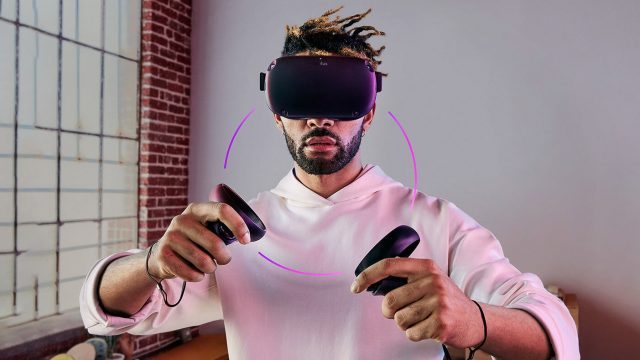Oculus has always taken a curated approach to VR content, being the first and last word on what VR content can and can’t be offered through their platform. But now the company plans to further tighten its grip on Quest content by imposing a higher quality bar, the company says, to ensure that the headset offers customers rich experiences while raising the likelihood of developers success (for those allowed in).
Each of the three major VR platforms (PSVR, Oculus, and SteamVR) fall in a different place along the ‘openness’ spectrum when it comes to content.
PSVR is the most strict of the three, with a more opaque publishing process and careful selection of which VR content makes it onto the platform.
Oculus falls somewhere in the middle; anyone can submit their games for review, and as long as they meet technical and content guidelines, they can be published.
SteamVR is the most open of the bunch, with the company recently expanding its allowed content scope to pretty much anything, so long as it isn’t illegal or malicious.
For Oculus’ upcoming Quest headset however, the company plans to move further toward the PSVR end of the spectrum; no longer will merely meeting technical and content guidelines be grounds for getting onto the headset—Oculus says they’re now going to vet content by their own impressions of scope and quality.
Oculus revealed the decision this week on its developer blog, saying that they believe that curating higher quality content for Quest is the right move for both customers and developers.


The company will now require that hopeful developers provide a “concept document” which should “show us not only how cool their title will be, but also to explain how it will resonate with the Quest audience.” Developers won’t be able to access the app submission process or non-public development resources for Quest unless their concept documents is approved.
In addition to making a great VR headset, we feel a strong responsibility to make the Quest VR content ecosystem successful for both developers and players. The Rift ecosystem has taught us that VR players respond to titles that have polish, substance, and depth, whether they are built by AAA game studios or talented indies. We hope that when players get into their Oculus Quest headset their library showcases the innovation, sophistication, and development talent that exists in VR today, and inspires future developers.
Oculus says that this more quality-focused approach to content gatekeeping is unique to Quest and that it will not impact the submission process for Rift, Oculus Go, or Gear VR.
We’ve set a high bar for content quality on Quest, higher than we’ve ever enforced before, in order to build a platform where everyone has confidence in the quality of the titles they’re buying and developers know that their investments have a strong chance of success.
The shift to more strict content curation sets up Quest to have a significantly more console-like feel than the company’s prior headsets, and their reason for doing so is clear: reduce shovelware and make the good stuff easier to find. But a more strict submission process doesn’t come without potential downsides, especially when allowing room for innovation.
Oculus ran into a notable dilemma in the Rift’s early days. The company was strict about content comfort levels, and for the most part hadn’t allowed any ‘free locomotion’ content onto its store, even though it already had a process for rating app comfort by three different levels: Comfortable, Moderate, and Intense. It seemed that for Oculus, free locomotion content was even too much to qualify for the Intense category.
But the market showed that, when done right, free locomotion can work well, and there’s clear player demand for the kinds of games that it enables. With the success of a pioneering free locomotion game, Onward (2016), Oculus was forced to reevaluate their position and in 2017 announced that the game would be coming to the Oculus store for Rift.
On stage at Connect 4 in 2017, Oculus’ then VP of Content, Jason Rubin, admitted the company’s mistake and made note of the lesson learned. “Indie developers are vitally important to VR. Their creativity, and often risk-taking, pushes the medium forward. And indie developers like [the developer of Onward] keep us on the edge of our seats waiting to see what’s next,” he said.
Following the release of Onward on the Rift, Oculus Studios began embracing more ambitious locomotion mechanics, with titles like Marvel Powers United VR (2018) using mechanics similar to free locomotion by default.
With the new, stricter rules for content quality on Quest, it seems likely that similar scenarios could play out—with Oculus rejecting content that doesn’t fit its pre-existing notions of what constitutes a quality VR game, only to have potentially innovative ideas taken first to other platforms (or possibly to one of the company’s other headsets). On the other hand, the more tightly curated approach means that Quest owners are likely to see overall higher quality content that hopefully keeps them happy and coming back to the headset for more.

